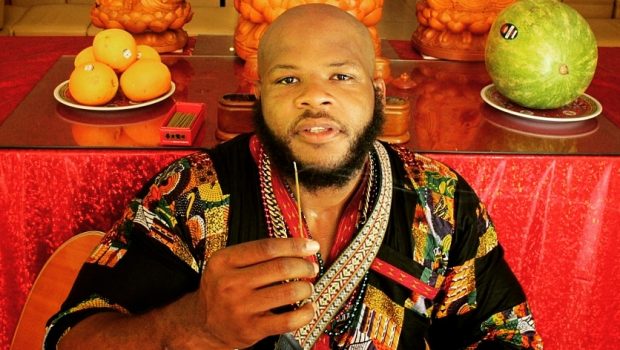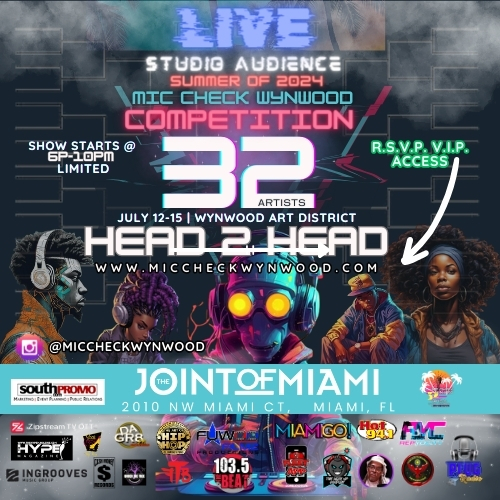Interview: Ace Burns, Taking The Revolution From NYC to Nigeria
Brooklyn rapper Ace Burns recently released the music video for “Black Berry Whine”, Ace’s self-produced “ode to my Beautiful Black Queens” featuring P5yckonomixxx. The track appears on Half-Caste: The EP, which also features guest appearances from old school heavyweights the World’s Famous Supreme Team as well as D.A.M.Y., YokeeGilla, Femi Nuga, Muyiwa Frank, Brain Rapper, Cassius King, Iam_danger and Bligen. Drawn to activism in the wake of George Floyd’s death, Ace gained notoriety via a Fox News interview which led to a terrorism charge, which he is currently fighting in court. “My father’s origin is Nigerian from Calabar,” Ace explains. “My grandfather is chief of the Esuk Atu people in Cross River, an Efik tribe. By contrast, my mother is African-American and I was born in Brooklyn. Not being considered full Nigerian in Nigeria, even though I’m a prince, and not being considered an American in America, even though my family goes back five generations, is why I call my first album Half-Caste.” Half-Caste is out now on Koinda Records.
Your new single is a welcome shot of energy in a pretty dismal year. How did it come about?
“Black Berry Whine” came to me while I was in the planning phases to my first album. I wanted a song that could start the discussion of who I was as a person. As the world was born by a Black woman, I knew my album had to start with a song about Black women. I had already put the production out there on a mixtape project, so I just needed the wordage. I had an idea in mind that I freestyled and then recorded. I wanted a voice like Bounty Killah or Vybes Cartel, so I reached out to my boy P5YCKOnOMixXx and he finished it up. I laid the track in one take while I was broadcasting on facebook live. I’m proud of the work I did, no short cuts and I haven’t regretted any parts of the release.
How has your activism evolved since the countrywide protests have calmed down somewhat? What do you think was the net effect? What do you see for the future?
My role has become more behind the scenes these days. Focusing on training and organizing black male leaders for the next stage of the revolution. In totality I feel like we’ve unearthed fertile ground for a new era. I’m not sure of my lifetime, but certainly in my son’s lifetime we will see peace and racial justice for all marginalized people. It is possible that America will reign as the first and only true democracy in the next stage of the industrial revolution, where man and machine co-exist in plentiful balance.
You’re a man who is deeply ingrained in both American and Nigerian society. What are the common struggles and big differences you see between the two? What can one learn from the other?
This question is the blueprint to my album “Half-Caste: The E.P.”. More specifically, this question is answered by my song “Wetin Dey Boot? (What’s in the Boot?)”. In that song, I play the voice of a 16 year old young man who is encountered by a racist police officer. What I describe is the same problem I’ve seen as I’ve traveled the world. On every continent and in every city, I’m seeing unchecked Police abuses of power, especially against the poor. This is the same focus in one form or another of my protest in the streets of NYC –we are fighting to end fascism. For context, in my song, I had my Nigerian music friends play different roles with the police. For instance, Femi Nuga plays the Nigerian scammer Hush Puppy, who sees the police he has no fear or worry because he’s already paid his tab. Likewise in the song, Yokee Gilla plays a politician who just purchased a Rolls Royce, and has a convoy to get to his meetings with foreign dignitaries. For the amazing chorus, I had Muywa Frank play the role of the police chief, who boldly sings, “Everyone’s a criminal (Oh yeah oh yeah oh yeah), I’m just catching criminals (all day all day all day), Me sef I’m a criminal, You better not say when you see me now! ” Finally, we have D.A.M.Y. who plays my 25 year old Lagosian counterpart. He faces the same rampant abuse as the rest of the working class in Lagos. Police in Nigeria are just as brutal to their people, and he describes who they pray on him and randomly pull him over on his way to work. These issues are daily occurrences but are not discussed in our music. As a real person, I make it a point that my activism in the streets mirrors the messages I’ve put in my music. As I travel back and forth to Nigeria the only difference I see now, is that African Americans are more aggressive with how they express their art and outrage. Nigerian society is typically more modest. The youth have not radicalized in Nigeria as much as in American and I believe it is because of the same lack of unity and tribalism I’m working to correct in NYC. Likewise, American marginalized people have to learn their own form of Wazobia (Wazobia is a dialect that was created merging different African languages into one and more importantly blending different tribes into one mixed culture).
How did you land the World’s Famous Supreme Team on a track? What was the recording process like?
No lie, that World’s Famous Supreme Team recording session was like the Intro to Drake’s “Pound Cake”. I just put as much talent as I could find in the room, we all got faded then we came out with the joint. I invited them to the session, but it wasn’t a given they would give us their blessing. They came through and talked with us, and understood who we were as men. They agreed to come back in an hour and hear what we had come up with… and the rest is history. Because of the way we did it “Mercedes Slide” has so much soul and, simultaneously, the blessing of two Hip-Hop O.G.’s that’s all I ever wanted for the last and 7th track on my E.P.
What are your plans for 2021, if plans are even a possibility in these times?
Honestly, I’m focusing on shooting the rest of the music videos for my album, and improving my Folk music collection. I want to leave more messages in my music, and my guitar has allowed me to connect way more with other audiences and musicians than anything else. With any luck, expect to see me perform at a major concert in either Nigeria or in New York City somewhere around the middle to end of 2021. I’m praying on performing again at Felabration in Lagos but with more resources and newer West African collaborations.
Follow Ace Burns on Spotify | Twitter | Instagram | Facebook | Soundcloud | aceburns.com
Tweet








































